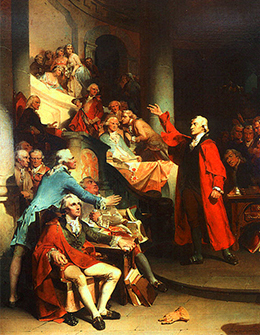| << Chapter < Page | Chapter >> Page > |
For many British colonists living in America, the Stamp Act raised many concerns. As a direct tax, it appeared to be an unconstitutional measure, one that deprived freeborn British subjects of their liberty, a concept they defined broadly to include various rights and privileges they enjoyed as British subjects, including the right to representation. According to the unwritten British Constitution, only representatives for whom British subjects voted could tax them. Parliament was in charge of taxation, and although it was a representative body, the colonies did not have “actual” (or direct) representation in it. Parliamentary members who supported the Stamp Act argued that the colonists had virtual representation, because the architects of the British Empire knew best how to maximize returns from its possessions overseas. However, this argument did not satisfy the protesters, who viewed themselves as having the same right as all British subjects to avoid taxation without their consent. With no representation in the House of Commons, where bills of taxation originated, they felt themselves deprived of this inherent right.
The British government knew the colonists might object to the Stamp Act’s expansion of parliamentary power, but Parliament believed the relationship of the colonies to the Empire was one of dependence, not equality. However, the Stamp Act had the unintended and ironic consequence of drawing colonists from very different areas and viewpoints together in protest. In Massachusetts, for instance, James Otis, a lawyer and defender of British liberty, became the leading voice for the idea that “Taxation without representation is tyranny.” In the Virginia House of Burgesses, firebrand and slaveholder Patrick Henry introduced the Virginia Stamp Act Resolutions, which denounced the Stamp Act and the British crown in language so strong that some conservative Virginians accused him of treason ( [link] ). Henry replied that Virginians were subject only to taxes that they themselves—or their representatives—imposed. In short, there could be no taxation without representation .

The colonists had never before formed a unified political front, so Grenville and Parliament did not fear true revolt. However, this was to change in 1765. In response to the Stamp Act, the Massachusetts Assembly sent letters to the other colonies, asking them to attend a meeting, or congress, to discuss how to respond to the act. Many American colonists from very different colonies found common cause in their opposition to the Stamp Act. Representatives from nine colonial legislatures met in New York in the fall of 1765 to reach a consensus. Could Parliament impose taxation without representation? The members of this first congress, known as the Stamp Act Congress, said no. These nine representatives had a vested interest in repealing the tax. Not only did it weaken their businesses and the colonial economy, but it also threatened their liberty under the British Constitution. They drafted a rebuttal to the Stamp Act, making clear that they desired only to protect their liberty as loyal subjects of the Crown. The document, called the Declaration of Rights and Grievances, outlined the unconstitutionality of taxation without representation and trials without juries. Meanwhile, popular protest was also gaining force.

Notification Switch
Would you like to follow the 'U.s. history' conversation and receive update notifications?